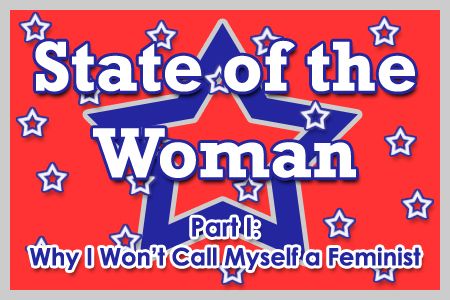
When someone asks me, "Are you a feminist?" it's difficult for me to say, "No," as calmly as I should. I do believe in gender equality, and I think that whether you are female, male, or otherwise, you should have the same amount of autonomy as everyone else. But the words feminist and feminism get my blood boiling. Why do I loathe them so much?
Because I do not think the words themselves promote gender equality.
I am all for the empowerment of all people and for gender equality. I don't like the idea of us as Americans living in the world of George Orwell's Animal Farm, where "all animals are equal, but some animals are more equal than others." I feel like the words feminist and feminism, being so close to the word female, send the wrong message. They imply that feminism is about female empowerment, not gender equality. To me, the two are no longer one and the same.
I know the definition of the term has changed over time. Technically, according to Merriam-Webster Online, one of the two current definitions for the word feminism is "the theory of the political, economic, and social equality of the sexes." However, the second definition is "organized activity on behalf of women's rights and interests." To me, those definitions are at odds with each other. Today, working for women's rights is not necessarily the same thing as working for gender equality. In a lot of situations it is, but there are a number of situations in which it isn't, meaning that women's rights ≠ gender equality. The two concepts aren't mutually exclusive, but they also can't be accurately substituted for each other in every situation.
Consider the hypothetical situation in which a city opens shelters for female domestic violence victims. Since the majority of domestic violence is perpetrated against females, this makes perfect sense, and women should have a place to go in order to escape being abused and get help safely exiting such a situation. No woman deserves to suffer at the hands of an abuser or be trapped with one. No one does. So, what do you do when a man is in need of the same services?
I realize that many people may scoff at that image - after all, male domestic violence victims are widely considered to be in the minority. That's great, but that doesn't mean they don't exist or that they have any less of a need for help. Since many shelters for battered women are for women only (for obvious reasons), how can you make sure people that are not female have the same right to help? How do you even define equal rights in this situation? Does each gender have equal rights if they have facilities in proportion with the predicted number of people of that gender who need them, or does the number and quality of facilities need to be equal? Is there gender equality if a man needs to travel further than a woman to obtain the same services?
In this hypothetical, whether you believe in women's rights or equal rights for all genders can matter quite a bit. Those who are primarily concerned with women's rights will applaud the decision, as these types of shelters are obviously clearly needed in many areas. Those who are truly concerned with gender equality will be uneasy. Sure, it's great that these resources are available to females, but what about the males in need of the same services? What about people that are transgendered? Even if more females need these services than anyone else, can there honestly be said to be equal rights among genders in this type of a situation? I don't think so.
Though many people who believe in gender equality will call themselves feminists, it's not a term I will ever be comfortable using to describe myself, because so many people associate it only with female empowerment. Every group, whether historically marginalized and disenfranchised or not, should be able to have the same rights to life, liberty, and happiness. Traditionally, that's what female empowerment was all about, allowing women to have the same rights as men. Today, in many ways, men and women are not equal - but women are not the only ones suffering because of it. That's why, in good conscience, I cannot identify as a feminist. Regardless of gender, all humans are should be equal, and some humans should not be more equal than others.
